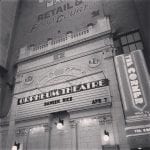WalMart and the economy of cheap
Used to be one grew up with the cliche: You get what you pay for, and grew into the truth of knowing it to be so.
A relative who knows us only well enough to see us at funerals and send Christmas cards sent Maggie a $25 gift card to WalMart.
We don’t shop at WalMart. We — which is to say my wife’s family — own a large independent bookstore, and two coffeeshops here in the foothills of Appalachia. WalMart was never part of my shopping experience until I moved to Nashville and there was one down the street. In the old days, I can remember running over there to buy underwear because I was on deadline and didn’t have time to go to the laundromat and discipline other people’s children. I can remember arguing with Susan when first we met that WalMart was a necessary evil in small towns, because the shopping options were otherwise limited.
And then we moved here, entered the retail world, and did some reading. So we don’t shop at WalMart.
This is principally because we wish to support other small, local businesses. Failing that, we order online, or drive to the nearest big city and do our best to buy from smaller businesses there. The best we can.
But it is also because we do not believe in the supreme value of cheap. Which is not at all the same as frugal.
They opened a Super WalMart recently, and we can already see the fresh cascade of local businesses failing. And, yes, some failed to compete, but most couldn’t, what with the economics of scale and all the other advantages of big business.
Still, Maggie, who is a few months shy of seven years old, has $25 to spend, and so off to WalMart we go, through the snow which keeps us all home from school, and probably for the whole week. I didn’t have $25 to spend until I was 16 and had a job (and I spent it on the first BTO album and Blood, Sweat & Tears’ greatest hits, if you must know), but that’s not the point. Maggie, who is a few months shy of seven years old, has doting grandparents, and friends, and parents, and a room full of more stuff (and stuffed animals) than even her acquisitive father can imagine. (Not counting the 10,000 CDs in this room, of course. The Duhks’ “Mountain of Things” ringing in my ears. And, yes, I know it’s a Tracy Chapman song.)
It takes an hour. We walk through aisles of cheap plastic stuff, presumably made in China. WalMart, best a quick Google suggests, is China’s sixth or seventh largest trading partner. The others would mostly be, y’know, sovereign nations. China is a major holder of U.S. government paper, a significant investor in our national debt. (Americathon, anyone?)
Or let me quote this, quoted in Bill McKibbon’s Deep Economy…”During the weekly meetings of company officers,” reports the New York Times, [WalMart] CEO Lee Scott “asks embarrasing questions like: ‘Why does Target make a better coffee maker and sell it for $19.95?…Before the meeting is over, the buyer is expected to get on his Blackberry or his phone and not only find out why but, ideally, to have found the same or better coffee maker. He is also expected to bargain with shippers so the company can sell it for less. Oh — and to place an order. An announcement that the coffee maker will be in stores the next week is the kind of line that get applause, and a nod from Mr. Scott.”
As it happens, we sell expensive coffee makers, which run something under $200. I’ve had one for a decade now. It’s beaten up, and occasionally requires cleaning. It makes great coffee. It still works.
We’re on our third vacuum cleaner in five years. We bought the one Consumer Reports rated highly, but the parts are plastic and it’s a device meant to bang and crash into things, to be stepped on (that’s part of how you operate it), and it’s built to fall apart. And so that’s what it’s doing.
Anyway. We’re at WalMart. Maggie has $25 to spend. The aisles are largely empty because it’s after Christmas, and we can see what didn’t sell because it’s deeply discounted. Most of what we see is a cobranding toy, Miley Cyrus or Twilight or whatever. It takes an hour for Maggie to find something, as we try to avoid the most obvious crap and teach her the value of money. Our legs are sore, even though both parents are wearing walking shoes and are accustomed to the strains working retail puts on legs.
The toy she finally bought, the best she and we could find? It’s already broken. It’s made of cheap plastic. It looks good in the package.
Which means it’ll become part of the landfill soon enough.
And from where I sit, that’s what they sell: Landfill. They are teaching generations that everything you can and should buy will not last, and should be quickly thrown away.
They are destroying our economy, and our ecology, and we are buying the myth that cheap is how we feel. (Hear: The Cowboy Junkies Trinity Session.) Or maybe cheap is how we feel. I just feel ripped off, and impossibly sad that my daughter feels deprived because we don’t take her shopping there more often.
This how we keep the poor poor, and constantly in need.




